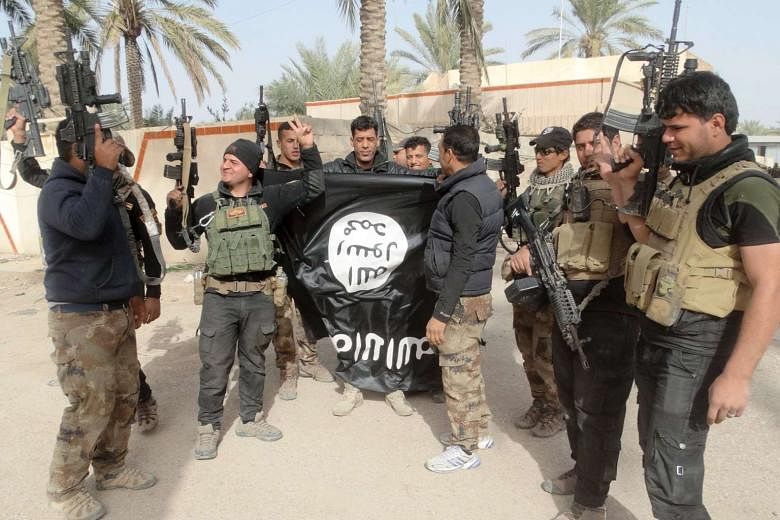WASHINGTON • Pentagon officials have concluded that hundreds more trainers, advisers and commandos from the United States and its allies will need to be sent to Iraq and Syria in the coming months, as the campaign to isolate Islamic State in Iraq and Syria (ISIS) intensifies.
In meetings with US President Barack Obama's national security team in recent weeks, military officials have told the White House that they believe they have made significant progress in the fight against ISIS in both Iraq and Syria, administration officials said.
But to deal a lasting blow to the extremist Sunni militancy, they believe additional forces will be needed to work with Iraqi, Kurdish and Syrian opposition fighters on the ground in the two countries.
In the past, the Pentagon's requests for additional troops in Iraq and Afghanistan have been met with scepticism by Mr Obama, and his aides have said he has resented what he has regarded as efforts to pressure him. But the rise of ISIS, also known as ISIL, has alarmed the White House, and a senior administration official said on Thursday that the President was willing to consider raising the stakes.
The US already has about 3,700 troops in Iraq, and a handful of Special Operations forces in Syria. One official said he did not anticipate that number increasing to more than 4,500 over time, and even that increase could come incrementally, much as the deployment of the 3,700 US troops occurred over a year and a half.
During that time, the White House and the Pentagon have taken pains to avoid describing the deployments as combat troops, instead calling them special operators, trainers and advisers.
Defence Secretary Ash Carter, in an interview last week with CNN, emphasised the limited role he anticipated US forces to play. "We're not looking to substitute for local forces in terms of governing the place and policing the place," he said.
The Pentagon's desire to expand the military presence on the ground comes as the American public remains sceptical of the country getting more deeply involved in the Middle East. Polls have shown that Americans are not convinced the Obama administration has a plan to defeat ISIS, which has maintained control of nearly all the large cities it took over in 2014.
"With more capacity, you can do more," said Mr Derek Chollet, a former assistant secretary of defence in the Obama administration.
But he added: "The challenge has always been what is that line between enabling and owning, and that's something the President will be focused on."
Recent victories by Iraqi security forces and Syrian opposition groups, aided by air strikes from the US-led coalition, have made Pentagon officials, including Mr Carter and the chairman of the Joint Chiefs of Staff, General Joseph Dunford Jr, more optimistic about the effectiveness of Iraqi forces if they are trained by Americans.
With the liberation of the Iraqi city of Ramadi last month, coupled with recent gains in northern Syria, senior military leaders say the war effort can focus on isolating - and then liberating - the ISIS-held cities of Mosul in Iraq and Raqqa in Syria.
"The reason we need new trainers or additional trainers is because that's really the next step in generating the amount of combat power needed to liberate Mosul," Colonel Steve Warren, spokesman for the US military in Baghdad, said last week.
The US has had little success in persuading allies to provide more troops. But Mr Carter and Gen Dunford do not want the US to be the only source for more forces.
"I have personally reached out to the ministers of defence in over 40 countries around the world to ask them to contribute to enhancing the fight against ISIL - more Special Operations forces, more strike and reconnaissance aircraft, weapons and munitions, training assistance, as well as combat support and combat service support," Mr Carter said in France last week.
He will meet next month in Belgium with the 27 countries that have participated in efforts to defeat ISIS.
Among those that have been invited are several Arab countries that initially participated in the campaign but have since contributed little. Mr Carter has singled them out, saying that it is time for them to become more involved.
"Every nation must come prepared to discuss further contributions to the fight."
NEW YORK TIMES

